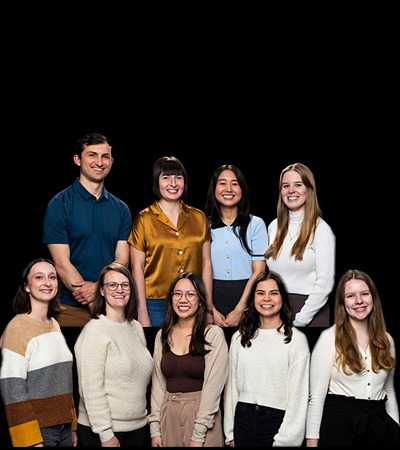Nomination category: Impact

The Hospitalized or Ambulatory Adults with Respiratory Viral Infections (HAARVI) Study Team
9 recipients from UW Medicine and the School of Medicine (listed below)
Nominated by Helen Chu, Professor, Medicine/Allergy & Infectious Diseases
Awarded 2024
I am nominating the HAARVI team within UW Medicine. This is a team of research coordinators and scientists who have been responsible for successfully conducting a research study to understand the immune response to SARS-CoV-2 infection. This study was started in March 2020, with enrollment of the first US COVID-19 patient, making it the longest standing study of SARS-CoV-2 survivors in the US, and has now expanded to over 600 patients followed over three years. The team has made really important contributions to the COVID-19 pandemic, including the development of the first mRNA vaccine, development of the Eli Lilly monoclonal antibody, and an understanding of how the virus escapes mutations and how people respond to the different types of COVID-19 vaccines.
Tell us why you are nominating this team
This study would not have been possible without the team’s efforts. At the beginning of the pandemic, the team was the first to receive authorization to work with SARS-CoV-2 samples in a research capacity at UW. At a time when we did not fully understand the transmissibility of the pathogen, they enrolled participants and processed hundreds of biospecimens. As the pandemic landscape evolved, the team also diligently modified the study to align with new guidelines and address pressing scientific questions. The retention in this study is remarkable; we hear from participants all the time how much they enjoy interacting with the research coordinators and how much they enjoy engaging in this study. The team provides regular updates to participants about the impact of their work, which is highly motivating for people to continue to enroll in the study.
What makes this nominee worthy of the DSA?
The team has shared samples from HAARVI with the NIH, the Bill and Melinda Gates Foundation, CDC, and with countless laboratories around the world, including labs at Harvard University, Vanderbilt University, Instititute for Systems Biology, Seattle Children’s Hospital, Bloodworks Northwest, Fred Hutchinson, Emory University, as well as many other institutions in Asia, South America, and Africa, which allowed laboratories in other countries to use these samples to help develop new COVID-19 antibody tests.
The HAARVI collaboration has led to over 50 papers in high impact journals including Science, Nature, Cell, and JAMA, in collaboration with colleagues at different academic institutions, and also with other departments at Fred Hutch and UW including Immunology and Biochemistry. Jennifer Logue, in particular, as the project director of HAARVI, wrote the first paper describing long COVID in outpatients in the US. This was highlighted by Dr. Tony Fauci at a White House briefing early in the pandemic, and is one of the most high impact and highly cited papers from the past three years.
The early work from HAARVI, and in particular the work around long COVID, has allowed for us to contribute to one of the first papers describing risk factors for long COVID, published in Cell and featured in the New York Times, and allowed us to successfully receive NIH funding and be one of the sites for a national long COVID study. Some national media coverage of HAARVI includes coverage by CNN and the New York Times: Almost a third of people with ‘mild’ Covid-19 still battle symptoms months later, study finds.
- Almost a third of people with ‘mild’ Covid-19 still battle symptoms months later, study finds (CNN).
- New Research Hints at 4 Factors That May Increase Chances of Long Covid (New York Times).
Was there anything else?
The HAARVI team is really a collaborative effort, and much of the success of this team has been the ability of everyone to innovate and think of new ideas and to put these into practice very quickly. From the project director to the research coordinators to the technicians who process the samples, everyone works incredibly hard. The research scientists and technicians have a remarkable ability to work together, to think of new innovative ideas such as how to collect samples from people at home who are too sick to come into the office, and whether to enroll people with new variant infections and after vaccines. The ability to do these types of studies in real-time was what allowed all of the valuable information about vaccines, long COVID, and new variants to be collected and disseminated so quickly.
Helen Chu
Professor
Medicine/Allergy & Infectious Diseases
Meet the Hospitalized or Ambulatory Adults with Respiratory Viral Infections (HAARVI) Study Team
- Anna Elias-Warren (she/her), Graduate Research Assistant, Allergy and Infectious Diseases, UW Medicine
- Nicholas M. Franko (he/him), Research Coordinator, Allergy and Infectious Diseases, UW School of Medicine
- Kristen Huden (she/her), Research Scientist I, Allergy and Infectious Diseases, UW School of Medicine
- Megan Kemp (she/her), Research Coordinator, Allergy and Infectious Diseases, UW School of Medicine
- Jennifer Logue (she/her), Manager of Program Operations, Allergy and Infectious Diseases, UW School of Medicine
- Ariana Magedson (she/her), Research Coordinator, Allergy and Infectious Diseases, UW School of Medicine
- Dylan McDonald (she/her), Research Coordinator, Allergy and Infectious Diseases, UW School of Medicine
- Helen Nguyen (she/her), Research Coordinator, Allergy and Infectious Diseases, UW School of Medicine
- Kino Watanabe (she/her), Research Coordinator, Allergy and Infectious Diseases, UW School of Medicine